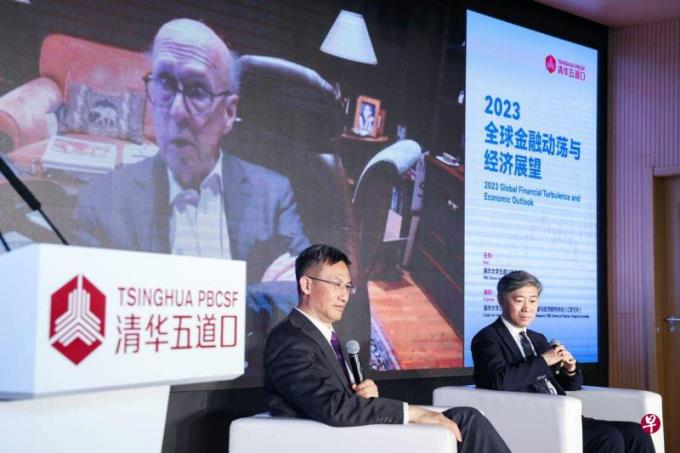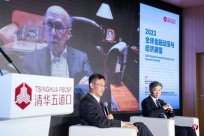
The Chinese economy has achieved super -expected growth in the first quarter of this year, and the "May 1" small holiday tourism has also rebounded strongly, but economists believe that the "sweet period" of recovery after the epidemic may not be able to sustainThe overall economy of China is still cold.
Lu Ting, the chief economist of Nomura Securities, Lu Ting, on Saturday (May 6), pointed out at the "2023 Tsinghua Wudaokou Chief Economist Forum" that the recovery of the Chinese economy this year is with the 2008 Lehman crisis and the 2015 stock market disaster.There is a significant difference in recovery.
Lu Ting analyzed, unlike the previous global economic recovery, the starting point of the economic recovery of various countries depends on the end of the epidemic.China ended the dynamic clearing policy in December last year, and the initial formation of group immunity at the end of January, and the economy began to rebound.Economic recovery intensity.
Followed by geopolitical issues.Lu Ting pointed out that China's recovery has faced an international environment with extremely complicated and difficulty.In 2018, trade conflict between China and the United States broke out, and the relationship between the two countries then turned sharply, and further deteriorated with the epidemic and the Russian and Ukraine War.
He believes that the impact of geopolitics on China's economic recovery is reflected in many aspects, including the US technology embargo on China ’s science and technology that directly affects Chinese scientific and technological progress and industrial upgrading, as well as foreign direct investment and internal manufacturing investment;Relevant legislation encourages multinational companies to transfer production capacity to the United States and friendly countries, affecting new investment in China; the confidence of entrepreneurs and high net worth individuals has also indirectly led them to reduce their investment and consumer demand in China.
China's GDP in the first quarter of this year (GDP) achieved 4.5 % growth, exceeding many analysts expectations.In the "May 1st" small holiday in the past, the tourism industry rebounded strongly. A total of 274 million people traveled in China, an increase of more than 70 % year -on -year.
But Lu Ting believes that it should not be too intoxicated in this round of consumption rebound, because the pulse effect of unblocking after the epidemic is difficult to last.
He explained that the epidemic brought scar effect, and many families' income decreased sharply during the epidemic, and the savings were consumed in large quantities; the shrinkage of the real estate industry also caused a negative wealth effect; coupled with the decrease in land fiscal revenue, the income of personnel in the system decreased;In addition, the unemployment rate of the labor market is higher, and the expected growth of residents' future revenue is also lower than before the epidemic.
Lu Ting said: "You can't be too optimistic because of the growth rate of the GDP in the first quarter ... The Chinese economy is in the sweet period of recovery after the epidemic, but this sweet period may be limited."
Li Daokui, dean of the Chinese Institute of Economic Thought and Practice of Tsinghua University, does not deny on the forum. Although the tourism industry recovers well, some economic indicators look good, but the consumer price index (CPI) and productionThe price index (PPI) shows that the Chinese economy is still cold.
China's March CPI increased by only 0.7 % year -on -year, an increase of 0.3 percentage points from February; PPI decreased by 2.5 % year -on -year, and the decrease was 1.1 percentage points from February.
Liu Yuanchun, president of Shanghai University of Finance and Economics and the co -founder of the China Macroeconomic Forum, analyzed that the price level was declined because of the poor recovery of supply and demand; the current retaliated rebound was a travel data, showing the recovery of social interactions, but it has not yet transitioned.To the repair of profit and the repair of the balance sheet.
The former chairman of the Asian region of Morgan Stanley, Stephen Roach, a senior researcher at Cai Paul China Center of Yale University, also bluntly stated that he has been optimistic about China in the past 25 years, but considering China's geopolitics facing the geopolitical politicsHe is more cautious now.
Roqi said that the Chinese economy will grow strongly this year, and it is easy to exceed the official setting 5 % target, or even more than 6 %."My caution comes from the prospects of growth after this year and compared with the strong long -term (growth) trend of China's economic display in the past 45 years, I now see that half of the water cup is empty."
Aesthetic scholars suggest to establish the Sino -US Secretariat in Switzerland and Singapore
Under the circumstances of Sino -US relations and effective contact between the two countries, American scholar Stephen Roach advocates setting up the "Sino -US Secretariat" in neutralized countries such as Switzerland and Singapore to promote mutual contact between China and the United States.
Roqi Saturday (May 6) said at the "2023 Tsinghua Wudaokou Chief Economist Forum" that the issue of Sino -US relations is already a "systemic problem".He made three suggestions on improving relations between the two countries in the Accidental Conflict in the new book.
First of all, re -establish trust.Luoqi said in the forum that this is easy and difficult to do, but it can start from some small steps, such as re -opening up the consulate that was closed before, relaxing visa restrictions, restarting student exchange plans, and relaxation of restrictions on non -governmental organizations.Rebuild the trust at the civic society between the two countries.
Followed by bilateral investment treaties to reduce investment barriers.He said that China and the United States had previously actively supported a bilateral Investment Treaty. In 2016, almost reached an agreement and should now return to the negotiating table and complete the negotiations.
Roki is also the former chairman of the Asian region of Morgan Stanley and a senior researcher at Cai Paul China Center at the Law School of Yale University.
Due to the lack of effective contact between China and the United States, Rich also strongly advocates the establishment of a "Sino -US Secretariat" as the core of the two sides.
He explained that this full -time institution can be located in a neutral country such as Switzerland and Singapore. The same number of personnel from China and the United States can work to work at the secretariat to focus on the cooperation research between the two countries; the secretariat can also invite experts from both parties, Solve some difficulties.
Luoqi said: "When a crisis occurs, there will not be a country's minister to call his colleagues in another country, but the other party does not answer the phone. When the balloon incident occurred on February 4 this year, this occurred.The situation. "


